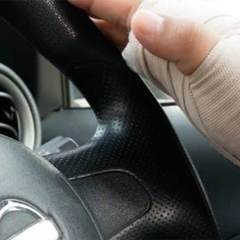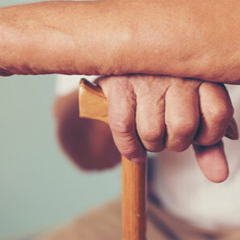nee replacement surgery is one of the most common and most successful procedures in all of medicine. With nearly 800,000 knee replacements are performed each year in the United States, those dealing with knee pain, stiffness or mobility issues may be wondering if knee replacement surgery is right for them.
When more conservative treatments have stopped working well, a knee replacement surgery can be an ideal option to get you back to living your best life. A complete knee replacement — more correctly, a resurfacing — places metal pieces to re-create the surface of the joint, with a plastic separator in between and possibly a plastic resurfacing of the inside of the kneecap (patella).
So, is knee replacement surgery right for you? Below we cover seven signs that it may be time, and that you should talk with your doctor.
Anatomy of the Knee
The knee joint is made up of two parts. The part of the knee between the end of the thigh bone (femur) and the top of the shin bone (tibia) is called the tibiofemoral joint. The patellofemoral joint is between the end of the thigh bone (femur) and the kneecap (patella).
The knee joint is surrounded by synovial fluid which keeps it lubricated. The bones are covered by smooth joint surface (articular) cartilage that allows them to glide smoothly together without friction. If the joint surface is damaged through wear and tear or a knee injury, arthritis can develop.
Tendons are tough cords of connective tissue that connect muscles to bones. Ligaments are elastic bands of tissue that connect bone to bone. Some ligaments of the knee provide stability and protection of the joints, while other ligaments limit forward and backward movement of the tibia (shin bone).
The knee consists of the following:
- Tibia: Shin bone or larger bone of the lower leg
- Femur: Thighbone or upper leg bone
- Patella: Kneecap
- Cartilage: A type of tissue that covers the surface of a bone at a joint and helps reduce the friction of movement within a joint.
- Synovial membrane: A tissue that lines the joint and seals it into a joint capsule and lubricates the joint
- Ligament. A type of tough, elastic connective tissue that surrounds the joint to give support and limits the joint’s movement
- Tendon. A type of tough connective tissue that connects muscles to bones and helps to control movement of the joint
- Meniscus. A curved part of cartilage in the knees and other joints that acts as a shock absorber, increases contact area, and deepens the knee joint
What Is a Knee Replacement Surgery?
Knee replacement surgery, also called knee arthroplasty, replaces a worn or damaged knee with an artificial implant (prosthesis). A knee replacement procedure is recommended for patients who have developed severe knee damage due to osteoarthritis or rheumatoid arthritis. This procedure may also be necessary for patients who have had fractures, torn cartilage or ligaments that have led to irreversible damage to the knee.
Knee replacement surgery is one of the most successful surgical options available, with more than 90% of knee replacements still in place after 20 years. It’s an option for treating pain and stiffness in the knee joint after all other non-surgical treatments have failed to relieve symptoms.
If knee replacement surgery is necessary, our expert orthopedic surgeons will help you determine what procedure is right for you and help guide you through the process of recovery.
Types of Surgery
There are 2 main types of surgery, depending on the condition of the knee:
- total knee replacement (TKR) – both sides of your knee joint are replaced
- partial (half) knee replacement (PKR) – only one side of your joint is replaced in a smaller operation with a shorter hospital stay and recovery period
Signs You Might Need a Knee Replacement
That said, here are seven reasons why you should consider knee replacement surgery:
- Non-Surgical Treatment Options Are No Longer Working
At the beginning of your knee pain journey, lasting relief may have been as simple taking a couple ibuprofen, using an ice pack or taking a hot bath. But if you have arthritis of the knee or another, you will probably start with more conservative measures, such as physical therapy, cortisone injections, medications, orthobiologics or weight loss, to alleviate your symptoms. But, at some point, they may not be enough.
Creating a tailored treatment plan that includes a combination of these treatments is the first step toward helping you heal your knee pain. But at some point, these non-surgical options may no longer provide the relief or healing power they once did.
- Your Knee Pain is Getting More Intense and Frequent
Chronic or constant pain is one of the most common reasons for surgery. This can be caused by arthritis, ligament tears and even bone spurs. If your knee pain is getting worse over time or becoming more frequent, this may be a sign that it is time to consider the option of knee replacement surgery.
Pain feels a little different for everyone, but there are some common types of pain we tell our patients to pay attention to, including:
- Knee pain that lasts for more than a couple weeks
- Knee pain that keeps you awake at night
- Knee aches during and after exercise
- Knee pain that doesn’t respond to over-the-counter medications, like acetaminophen and ibuprofen
- Knee pain that gets worse in humid or cold weather
- Your Pain is Bone on Bone
Knee osteoarthritis is manifests with bone-on-bone pain, which results from the deterioration of the cartilage that protects the bones in the leg from rubbing against each other. To diagnose the cause of bone-on-bone knee pain, physicians must examine the knee and take x-rays of the joint to make sure that the discomfort is not caused by another problem that may not even be solved with knee replacement surgery.
Although some people who were very active in their youth develop knee arthritis, others who led equally active lives do not. Conversely, some people who were sedentary experience knee issues while others never do.
We believe that the risk of knee pain is likely due to a combination of genetics, activity level, and a history of prior injuries to the knee, which are known to increase the risk of arthritis. Being obese or overweight is another important risk factor. Unfortunately, weight has a significant effect on the loads your knee joints are expected to carry and can increase the wear rate of the cartilage.
- You Notice Swelling In Your Knee
Swelling is another sign your knee is not responding to other treatments. Cartilage helps protect your knee from pressure and friction caused by walking and moving. Knee conditions, including knee osteoarthritis, can cause the cartilage around your knee to wear out. Arthritis is painful and leads to inflammation. And when knees become inflamed, they can swell.
A knee that is consistently swollen despite the use of anti-inflammatory medications, steroid injections and physical therapy suggests degeneration of the cartilage and/or instability of the knee, which can be confirmed with an X-ray. This can make you a candidate for a total knee replacement, he says.
- Your Daily Activities Are Disrupted
Putting off a trip to the grocery store because you are still achy from your workout is normal. But struggling with daily activities because of persistent knee pain is not normal. If you are having difficulty getting dressed or taking the trash out, despite the use of pain-relief medications, you might need more intensive treatments.
We all slow down a little as we age. You may need to trade the yearly marathon for brisk walks around your neighborhood after dinner. Or you may stop playing basketball in favor of low impact dance classes. Making small adjustments because you are aging is part of life. But knee pain should not keep you from doing activities you love.
- Your Mobility Has Become Increasingly Limited
Losing some joint flexibility as you get older is normal. But persistent knee stiffness that effects your mobility can be a sign of a more complicated knee concern. If you have knee pain and cannot perform some activities because of it, then knee replacement surgery may be right for you. The surgery can help restore function and mobility to your knees so that you can do things like walk without pain or participate fully in daily activities like gardening or golfing.
One of the most important things to keep in mind here is that losing mobility can affect more than just your ability to get around. As mobility decreases, inactivity increases. The less you move, the more your joint function and muscle strength can decline. Waiting until you have lost too much strength and function means that you will not likely get the maximum results from a knee replacement since your body may not be able to recover as well. Talk to your doctor soon to determine whether or not you are ready for knee replacement surgery.
- Your Knee Has Become Deformed
If your arthritis is advanced, it can affect the way you walk, which can also lead to further problems elsewhere in your body. As arthritis progresses, the knee may become bowed or twisted. If this type of deformity develops over time, a knee replacement may be ideal. In addition, those suffering with arthritis may also lose the ability to straighten their knee. If this happens, you should seek an evaluation with an orthopedic surgeon, as this loss of motion may be permanent.
What Happens During a Knee Replacement?
On the day of your surgery, you will receive anesthesia to numb your body and make sure you don’t feel any pain. An anesthesiologist will give you either general anesthesia to put you to sleep during your surgery or a regional anesthesia to numb you from the waist down.
During a knee replacement, your surgeon will:
- Remove damaged cartilage and bone.
- Insert the prosthetic knee joint.
- Insert a plastic spacer to replicate the smooth cushioning effect of your damaged or removed cartilage.
- Reshape your patella (kneecap) to fit the new prosthetic knee joint (if needed).
Recovery and Outlook
It usually takes around a year to recover fully after a knee replacement. But you should be able to resume most of your usual activities six weeks after surgery.
Your recovery time will depend on several factors, including your age, activity level before surgery and any other health conditions you may also be dealing with.
Your surgeon will give you a customized recovery plan, but in general, you should:
- Ice your knee a few times a day for 20 minutes at a time
- Elevate your knee above the level of your heart as often as possible.
- Keep your incision clean and covered
- Do your exercises as often as your surgeon instructs as they will help your recovery and make sure your joint regains its function.
- You will work with a physical therapist for up to a few months after your surgery. They will help you start moving safely, including bending your knee and walking.
Pain Management After Knee Replacement
Since one of the top goals of knee replacement surgery is the alleviate pain, people who experience intense pain after surgery often undergo emotional distress, such as anxiety, depression and overall disappointment. Pain management after surgery is essential to improve health-related quality of life.
After surgery, you will feel pain, especially in the first few weeks of your recovery. You will feel pain from the surgery itself and pain as your body begins to heal. Your surgeon will suggest a combination of prescription pain medication, over-the-counter nonsteroidal anti-inflammatory drugs (NSAIDs) and acetaminophen to relieve your pain. Try to stay ahead of the pain. Do not wait until the pain is at its worst. As soon as your pain level is severe enough to make you uncomfortable while resting, begin your medication. This way the medication will already be working by the time the pain increases.
Call Ventura Orthopedics Today!
If none of these changes or even rest help ease the pain, contact your Ventura Orthopedics provider to make sure there is not something more serious behind the aches. You don’t want knee pain or injuries to hold you back from living an active life! Our board-certified orthopedic surgeons specialize in knee, foot and ankle surgery and deal with both common and complex disorders associated with running.
If you are experiencing pain associated with knee injuries that need professional help, contact Ventura Orthopedics. To schedule an appointment with one of our hip replacement specialists at any of our five convenient locations throughout Ventura County, California – in Ventura, Oxnard, Camarillo, Thousand Oaks, and Simi Valley, call us at 800-698-1280.















